After kicking things off with the awesome into song written by our recent guest Frank Allison, we jumped right into things with University of Michigan Associate Professor Rebecca Hardin, the host of WCBN’s environmental news show It’s Hot in Here, and avid hunter Ben Connor Barrie, the editor of the Ann Arbor blog Damn Arbor. The idea was for us to discuss Ann Arbor’s somewhat controversial deer cull, but, as sometimes happens, we spent a good deal of our allotted time together just getting to know one another. Eventually, though, we got around to the topic of Ann Arbor City Council’s recent 8-1 decision to allocate $35,000 so that sharpshooters from the U.S. Department of Agriculture could be brought into city parks at night in order to kill up to 100 deer, thereby restoring balance to our delicate local ecosystem.
Hardin, Connor Barrie and I discussed the growth of the local deer population, and the research that has been done thus far. [Two aerial deer surveys were completed of Ann Arbor’s first and second wards. A February 10 survey counted 116 deer. A March 6 survey counted 168 deer. This growth rate, according to experts, is untenable.] We discussed issues that have been raised on both sides of the debate, from the belief held by some that this upcoming cull is only happening because a small, vocal group of Ann Arbor home owners are tired of having their shrubbery eaten, to the view that, if the herd isn’t thinned, we might experience an outbreak of life-threatening Lyme Disease. We discussed the impact our deer have on our native plant species, as well as the ethical concerns raised by those who see these animals as “kindred life forms” deserving of compassion.
While both Hardin and Connor Barrie seemed to agree with the ultimate decision of Ann Arbor City Council, they acknowledged the merit of the arguments made by those against the cull. As Hardin, who studies human/wildlife interaction and wildlife management, pointed out, this discussion about having sharpshooters in our parks is happening at the same time that we, as a community, are debating whether or not we should allow guns in our schools. And there are those who, justifiably, would like to see us find more modern, less violent ways to address the problems that confront us as a society. Unfortunately, according to Barrie, the other possible solutions that have been discussed thus far are both costly and illegal. [Apparently, while there’s been talk of dosing our local deer population with birth control, doing so is currently against the law. Furthermore, according to Barrie, it’s estimated that this would cost approximately $1,000 per deer.]
In the end, my sense is that both Hardin and Connor Barrie feet as though the impact on our local ecosystem just can’t support our increasing deer population. While, yes, people could put up fences, and perhaps plant fewer hostas in their yards, our growing deer population would invariably do significant damage to our public spaces. As Connor Barrie noted, if we intend to stay on our present course as a community, prioritizing native plant diversity in public spaces, we cannot, at the same time, allow the local deer population to grow unchecked… Here are Connor Barrie [who once grilled deer meat live on the Saturday Six Pack] and Hardin discussing the increasing impact our deer have on local biodiversity; our native plant species, our pollinators, and our migratory birds.
[If you would like to listen to episode thirty-three of The Saturday Six Pack, you can either download it from iTunes or scroll the bottom of the page, where you’ll find the Soundcloud file embedded.]
Then, at the 37-minute mark, we talked about our local fish population with Elizabeth Riggs, the deputy director of the Huron River Watershed Council, and Schultz Outfitters fly fishing guide James Hughes.
We started off by talking about species diversity… The problem, as it was explained by our guests, isn’t that we don’t have good species representation in the Huron. It’s that these populations, generally speaking, are small. According to a recent shock study conducted in the Huron River, Hughes said, we have both small and large mouth bass, white bass, two different sucker species, and various darters and smaller fish. And, of course, we have carp, which thrive in the warm waters of the Huron. [Riggs added later that we also have rock bass.] The problem is, with the exception of the carp, these fish are relatively little, and in small numbers.
This, says Riggs, is largely due to the dams along the Huron, which have changed the flow of the river, and thus the ecosystem. [There are 10 or 11 dams along the entire river, 5 of which are between Ann Arbor and Ypsilanti.] The water, she says, is, for the most part, warmer and shallower than it has been in the past. While Riggs says this could change in the future, as aging and costly dams are removed, like was done some time ago in Dexter, there are things that we can do now to help our native fish populations… And that work is starting this week.
Funded by the Watershed Council’s RiverUp! campaign and a grant from the Wildlife Conservation Society, efforts are currently underway to redirect 20 mature trees so that they hinge over the river, where their branches will provide protective canopy, giving local fish species slower areas where they can rest along the river while avoiding predators. Furthermore, work will soon begin in the area of the Riverside Park gazebo, where a little excavation will be done in order to add depth, and rocks will be put in place to both slow the current and provide cover. As a result of these activities, Riggs says, we may not just increase our small mouth bass, rock bass, and sucker populations, but also start to see these fish increasing in size.
Hughes, who has been leading fly fishing tours along the river for years, says he thinks that, by doing this, we very well might also convince some larger fish to come back into the river from Ford Lake. The big fish, according to Hughes, like the lake, as it has both depth and cover, but they come back to the river every spring to look for quiet, shallow areas in which to build their nests and spawn. And, he suspects, some may spend more time in the river after spawning, once these habitat improvements are made. Small mouth bass, for instance, may prefer the river, he said, as they typically prefer the flow of rivers to the stillness of lakes.
[note: We were interrupted at the 41-minute mark by someone claiming to be our favorite, somewhat-retired prank caller, The Who Guy, who wanted to make it clear that the person who called in last week, claiming to be him, was not in fact him. I won’t go into a lot of detail here on our discussion, but it’s worth listening to, if only to hear him snap at me, saying, “I don’t want to do your job for you,” when asked if he could explain to people in the audience how he defined himself.]
We also talked a bit about carp, which Hughes defended. [Schultz Outfitters specializes in warm water fly fishing and carp.] Yes, they’re invasive, he said, but they’re been here for over 100 years, and the ecosystem has adapted to them. [People from other states he says, come to Ypsi to fish for our carp.]
And, we also talked a bit about non-fish subjects, like the fact that the Huron is getting cleaner with each passing year, and the fact that, just a few hours before we went live on the show, a dozen or so volunteers outfitted with chainsaws and various pieces of machinery, set out to create an access point for canoes and kayaks on the north end of Frog Island Park… Here are Hughes and Riggs telling us about life beneath the surface of the Huron.
And, then, at the 59-minute mark, we began talking about bats with Aja Marcato, the conservation programing director at the Organization for Bat Conservation, who had brought with her a Big Brown bat. [Big Brown bats, as we learned, are the second largest bats in Michigan.] We talked about why bats are so important to our environment, the nine different species that live here in Michigan, and the threat they’re facing due to habitat destruction and pesticides. [As Rebecca Hardin mentioned in our first segment, much of the debate around widening Geddes Road is that, in order to do so, several old-growth trees, which are homes to countless local bats, will have to be removed.] Most of our time, however, was spent discussing the spread of the devastating bat disease White Nose Syndrome, which, according to Marcato, could wipe out as many as 95% of some of our bat species. [It’s believed that the spores were carried by a spelunker from a cave in Europe to a cave in New York.] While researchers are working on a treatment for the deadly fungus, it’s unlikely that treating bats will be easy, and, in the meantime, we’re already beginning to see the negative effects spread from the east coast.
We also discussed the undeserved bad rap that bats get [sucking blood, spreading rabies, and getting tangled in people’s hair] and the fact that, to a large extent, it can be attributed to the fact that, until somewhat recently, we didn’t really have the tools to study and understand bats.
Here are Marcato and her bat, Nikola, explaining to us why we should all be building bat houses. [In the wild, bats like Nikola, eat up to 2,000 bugs a night.]
And, toward the end of the show, beginning at the 1:37-mark, we invited in musician Heather Evans, who just recently relocated to Ann Arbor from Marquette. Between songs, we talked with Evans about what it was like growing up in Marquette with a father who was a small town radio personality, her passion for roasting coffee, her experiences on the road with a bluegrass band, and the time she played a wake for a 70 year old in Wisconsin who was still alive… The man being celebrated at the wake, who called himself Wild Man, apparently wanted to have his big going-away party when he was still in a position to enjoy it. According to Evans, he spent his time dancing on the lid of his coffin and serving shots. [Wild Man’s friends used a wood-burning kit to leave their names and messages of love on the coffin, which he intended to use once he passed away.] …Oh, and we also talked about her experience recording for Matt Jones when he rolled through Marquette, collecting song for his now-statewide River Street Anthology project. Here’s Evans performing for us. [Her set, which is awesome, begins at the 1:50-mark.]
Oh, and somewhere during the segment with Evans, our part-time music director, the great Jim Cherewick, burst into the studio to cover the Ted Nugent pro-hunting anthem Fred Bear. [Listen at the 2:27-mark.] Here’s Jim totally redeeming himself for that time he phoned in the cover of the Go-Gos song Vacation.
Thanks, as always, to AM 1700 for hosting the show, Kate de Fuccio for documenting everything with her camera, and Brian Robb for running the board, making sure the bills paid, and insuring that the toilet paper and bleach stays stocked. [All photos above come courtesy of Kate.]
If you like this episode, check out our archive of past shows at iTunes. And do please leave a review if you have the time, OK? It’s nice to know that people are listening, and, unless you call in, that’s pretty much the only way we know.
Now, if you haven’t already, please listen for yourself, and experience the magic firsthand… Oh, and tell you friends.

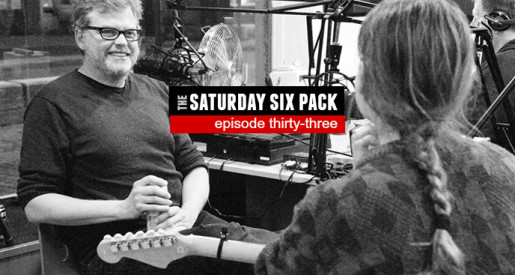
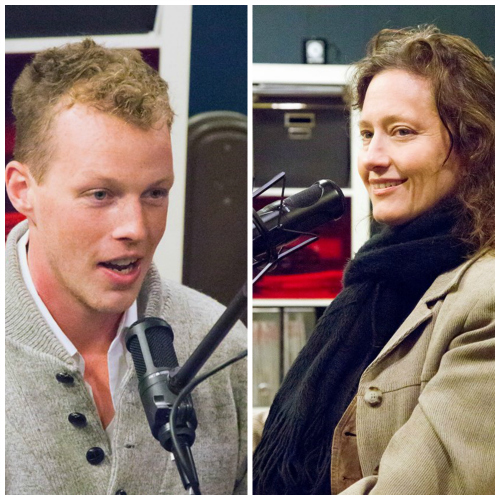
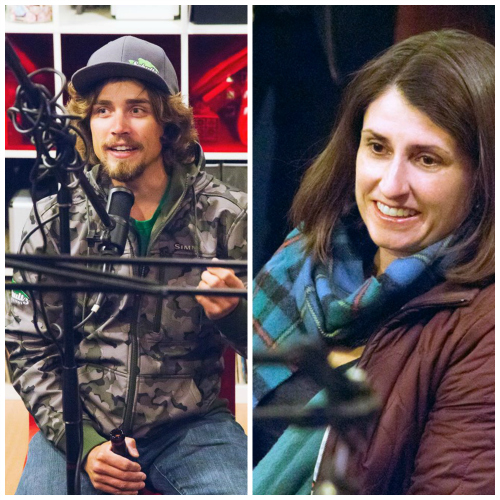
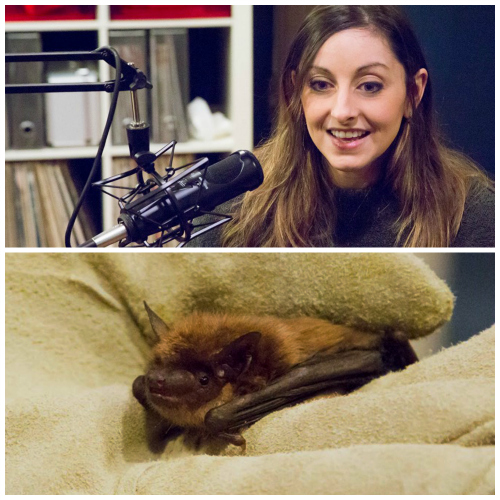

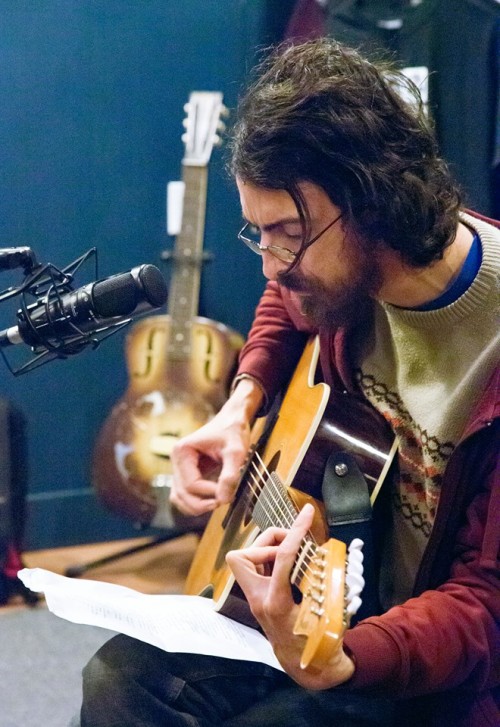











30 Comments
I always sing Fred Bear as “threadbare” which gives the song a different feeling.
“kindred life forms” is in quotes why? probably related to cute and quirky grilling of deer meat on a radio show, the kind of preciousness that makes me feel like a broken laugh track. the activity doesn’t annoy me as much as the telling of it, repeatedly, as if it were a meaningful peculiarity. but there’s no there there. sorta like when someone shows up and takes his clothes off, hijacking a serious discussion about affordable housing.
Did you listen to the show with Colin, kjc? He did not hijack the conversation about affordable housing. He came on at the end of the show, during the segment with Tom Perkins, and he did not interrupt the conversation. He merely disrobed.
Also, I’ve yet to listen to this episode, but my guess is that “kindred life forms” is in quotes because it is a quote.
Thanks, Mark. I had a great time. (Loving the strange topics that surround “music by Heather Evans”)
If the deer are unwanted why not send them to Ypsi?
Great show all around. This was, to my mind, the best review of the deer cull issue I’ve seen. The first, really, that placed the discussion in context of the larger ecosystem and the larger gun control debate.
As for the ‘kindred spirits’ in quotation marks, it seems apt. Some people may view the deer as kindred spirits, but I can guarantee you the deer don’t feel that way.
Humans regularly screw up animals with their preciousness. We feed them, dress them, line up to ogle them, domesticate them, and subject them to disease and starvation rather than kill them because we need to deny death. We use animals as projection screens for our fears and hopes. We don’t respect them as creatures with their own largely mysterious way of being in the world. This show did something to amend that. Thanks.
Maybe eating a little deer meat, rather than being ‘cute and quirky’, would have been a way of acknowledging who we are in all this. It didn’t happen on this show, so KJC clearly wasn’t listening closely, if at all.
There will be an all local meat episode in the future.
The anti cull side has said that the mention of Lyme Disease is only fear mongering. Do they have evidence on their side? Do we know that Lyme Disease will increase with the population?
FWIW, I had a less than positive view of the anti cull group before listening to this. Something Hardin said about guns, however, caused me to reevaluate my position. I’m still pro cull but I like the idea that we’re advanced enough as a society to solve the problems that we face without guns, explosives and violence. It may not be possible in every case, but I like having it as a goal to strive for.
No mention in the fisheries discussion of the Pall-Gelman 1,4 Dioxane Plume in Ann Arbor. Most coverage emphasizes that it is unlikely to enter above Barton dam and so affect Ann Arbor’s water supply, but Ypsi is downriver and will definitely be exposed. Ypsi’s water comes from Detroit so no danger there, but I have heard conflicting reports about how those concentration levels of dioxane could impact aquatic life and the over all health of the river. I’m hoping it’s not discussed because it’s a non-issue. I’d still love to hear someone speak to that at some point.
I’d also love to know if the Charles Gellman who donated so generously to U-M’s school of Public Health Risk Science Center is the same man whose company polluted our ground water and fought any obligation to clean it up.
It wasn’t dealt with in much detail, but the Gelman contamination was mentioned during episode 21, when Laura Rubin was on from the Huron River Watershed Council.
http://markmaynard.com/2015/07/the-gay-agenda-the-huron-river-and-the-dirty-mooney-on-episode-21-of-the-saturday-six-pack/
Jim playing Ted. All my dreams have come true!
True story, Ted used to have a hunting store here in Jackson, and I have friend who threw a bowling ball through his storefront window.
We don’t hold grudges, Jean. We gave the president of Marsh Plating a citizenship award just a few months after his factory released a toxic cloud over Ypsi.
I am still annoyed about that incident with Marsh Plating. It killed some of the plants in my yard, caused all of the metal on my house to rust, probably shortened the life of the car I was driving at the time which rusted out within a year or so, put me in danger, and killed my favorite tree on the block which was a maple next door that had really nice colors in the fall. Did I ever get any kind of acknowledgement from them? Nope. My impression was that their attitude was not one of a company looking to be part of the community.
Re: guns as a point of discussion in Ann Arbor: I think aversion to gun violence is natural but when extended to hunting becomes anxiety. And anxiety is a distortion that impairs decision making. When gun control advocates start equating hunting rifles with hand guns, we lose a lot of backers. We also confuse the issue. Rebecca was generous to all opinions, because that’s how she is. She’s a lot nicer than I am:)
Are you saying that bats *don’t spread rabies? Because if one even touches you, you’re supposed to get vaccinated. Their reputation as bug eaters is overrated—plenty of birds eat far more.
No one denied rabies. They just said that the good done by bats outweighed the bad.
Jean, it’s the same Charles Gelman. I’m not taking his side, however, I know someone who 20 years ago used to be an environmental chemist, who had a role in testing and monitoring the plume (not a Gelman employee). According to my friend, Gelman Sciences consulted the Michigan Department of Natural Resources about dioxane disposal, and they did exactly as instructed. It was many years afterwards that scientists discovered dioxane is more dangerous than anyone thought. Again, let me repeat I’m not on his side, and I believe that businesses should be held accountable for externalities, but I am sympathetic to Gelman’s point that their disposal method was not only legal at the time, but was exactly as the Michigan DNR instructed, so the State of Michigan should share some of the blame.
Yeah, “kindred life forms” was an exact quote from Rebecca. I believe she said it twice during the show, and it made an impression on me. So I noted it, as I note most things said to be during the show that make an impression.
As for my making mention of Ben having grilled venison on the show once, it seems as though you’re not mad at him for doing it, but at me for mentioning it. And, again, that’s what I do. When people say and do interesting things on my show, I mention them. And, on occasion, I reference things that happened on past shows. On this show, we were talking about deer, so I thought it was relevant to link back to the past show where Ben cooked me venison for the first time. I’m sorry if, for whatever reason, you didn’t like the reference, KJC.
Lastly, as was pointed out by others, Coin did not interrupt a conversation about affordable housing. That came much later in the show.
It may seem like a little thing, but I wanted to mention it here before I forgot it, as I didn’t put it in the post… During my discussion with Elizabeth Riggs about the river, when we were talking about dams, I noted that rich people, in my experience, didn’t want their removal, as expensive lakefront estates tend to move farther from the lakes they’re on once dams go away. And Elizabeth responded by saying that I might not exactly be right about that, as may property owners like the fact that, while they’re moving further from the water, they’re also picking up free property. (Apparently, when the water recedes, you own the uncovered land between your property and the water.) It’s not something I’d thought of before, and it’s worth consideration. I’d always just assumed that the rich and powerful would be dead-set against dam removal, but maybe that’s not the case…
And I see Ted’s zebra striped bronco around town. In an odd twist, his very friendly wife teaches pilates classes in the area.
Also, my friends were caught for the act but not prosecuted. Their punishment was to meet Ted. They never told me what happened, but I suspect he put them in a “stanglehold.”
I’m really tired.
Peter Larson is tired and thought we should now. He believes perhaps that our concerns are pedestrian. Dialogue about local politics and circumstances anywhere will always look like a circus from 3000 feet up or 3000 miles away. It’s a lot more frustrating but also real at ground level. It matters here. Maybe we should all just focus on Pete’s feelings instead.
Are deer unusual in that they are so voracious, or at there other animals that we should be culling as well?
I would set an army of kids loose in Ann Arbor with hatchets to go after gophers.
Yes, please focus on my feelings.
I had nothing else to write. I hate deer. Kill them all.
Interesting.
“Group aims to recall several Ann Arbor council members over deer cull”
Read more:
http://www.mlive.com/news/ann-arbor/index.ssf/2015/12/group_threatens_to_recall_seve.html
From Kirk Westphal:
National Geographic writer Richard Conniff examines the activist role of the Humane Society of the United States (HSUS) in the conflict over Ann Arbor’s deer management program. “HSUS… claims to be dedicated to creating ‘a humane and sustainable world for all animals.’ But what this generally means is protecting warm, furry mammals…”
http://www.takepart.com/article/2016/04/07/deer-cull-animal-rights
2 Trackbacks
[…] see our recent conversations with the Huron River Watershed Council’s Laura Rubin and Elizabeth Riggs, both of whom are fighting to increase the role the river plays in our […]
[…] I didn’t let him say a single word. And, the time before that, we forced him against his will to perform the Ted Nugent song Fred Bear.] I’m told that, among other things, Jim will be performing two brand new tracks, and […]